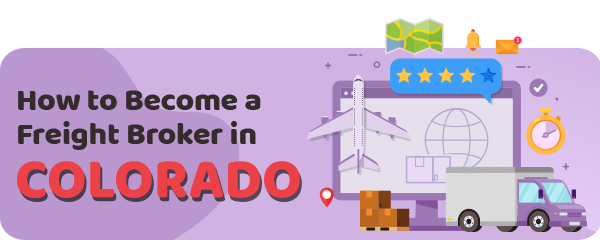Being a freight broker can be a fun, and fast-paced career.
Freight brokers assist shippers with freight that is ready to haul; they find carriers that can get the load to its destination.
They broker deals with shippers and facilitate the delivery of the shippers’ freight.
They keep communications open with the carrier, so they can confirm the status of the load with the shipper.
They are also on hand to handle any issues concerning the delivery of the load, especially as it relates to weather, broken down vehicles, etc.
To begin a career as a freight broker, many people take classes online or at community colleges.
Others rely on their industry experience.
Before considering a career as a freight broker, having the following in place is step number one:
- Have a high school diploma or high school equivalency
- Two or more years of industry experience
- Identify shippers that are reliable and ask for proper rates
- Ability to troubleshoot issues
- Great communication skills
- Outstanding negotiating skills
- Ability to write and negotiate contracts
- Make the right contacts, so you can keep the business thriving
Article Table of Contents
What are the Duties of a Freight Broker in Colorado?
Freight brokers in Colorado are responsible for finding carriers that have skilled drivers and a good reputation in the industry.
The more reliable the carrier, the better it looks for the freight broker.
If the shipper has confidence in the broker and shipper, the broker is likely to get repeated business.
Freight brokers can be an important asset to carriers, as they can help carriers make money because they can help them get loads to haul.
Here are some of the general duties that a freight broker in Colorado can expect to perform on a regular or daily basis:
- Secure leads that will help keep the freight broker in business
- Find and provide ongoing work to reputable carries
- Negotiate fees and provide customers with quotes for service
- Book and monitor load status and delivery
- Work with shippers, carriers, and dispatchers to coordinate load pick-ups and deliveries
- Keep a record of all activities
- Troubleshoot issues causing late deliveries
- Learn to utilize load boards to help keep trucks filled
Licensing Requirements of a Freight Broker in Colorado
In Colorado, freight brokers do not need any certifications to operate their business.
But they must meet the criteria mandated by federal requirements.
These requirements are set forth by the Federal Motor Carriers Safety Administration (FMCSA).
The FMCSA is the Department of Transportation responsible for regulating the entire trucking industry.
As freight broker begins their career, they must register their business with the U.S. Department of Transportation; they will assign a U.S. DOT number, which is needed before an individual can get a license.
The cost for this license is $300.
Those pursuing their career also need to do the following:
- Get general liability insurance
- Secure at least a $75,000 surety bond
No formal classes are required to become a freight broker in Colorado.
However, many choose to take broker or agent classes.
These classes will explain licensing, federal government requirements, and regulations and create contracts.
In many cases, schools that offer these programs help graduates find good jobs.
Freight Broker Programs in Colorado
Even though many people have experience in the transportation industry, they still find it valuable to take classes in freight brokerage, as there is a lot of responsibility on their shoulders.
They could be booking thousands of dollars in goods.
So, they need to know how to properly ensure the load, find reputable carriers, and attract well-paying loads.
In the state of Colorado, there are several good educational options.
Here are a couple of local programs:
- Denver-based Freight All Kinds, Inc. offers a four-day intensive course for $2,999.
- Arapahoe Community College
- Pueblo Community College
- Western State Colorado University
How Much do Freight Brokers Make in Colorado?
In Colorado, those just starting their freight broker career can expect to earn about $26,760, according to the Bureau of Labor Statistics in 2018.
As brokers become more experienced, they can earn as much as $63,360 per year, plus commissions for the shipments that they fulfill as a broker.
Annual Salary Range:| Location | Avg. Annual Salary |
|---|---|
| Denver | $53,344 |
| Colorado Springs | $52,500 |
| Aurora | $53,308 |
| Aspen | $52,765 |
| Fort Collins | $51,350 |
| Arvada | $53,344 |
| Pueblo | $48,918 |
| Westminster | $53,344 |
| Boulder | $54,035 |
| Thornton | $53,344 |
Regional Salary in Colorado
| Region | Employed | Avg. Annual Salary | Avg. Hourly Pay | Top 10% Annual Salary | Bottom 10% Annual Salary |
|---|---|---|---|---|---|
| Denver-Aurora-Lakewood, CO | 630 | $51,600 | $24.81 | $66,910 | $44,340 |
* Employment conditions in your area may vary.
Frequently Asked Questions
What are the benefits of taking classes to become a freight broker?
Even those with industry experience can benefit from taking freight broker classes.
Some will even help find students jobs in the industry following graduating from the program.
Can I make six figures as a freight broker?
Yes, but it takes a lot of hard work and working with respected carriers, and constant shipping needs from shippers.
Is there a need for freight brokers today?
Yes, there continues to be a need for freight brokers.
The trucking industry is booking again, and brokers help keep those trucks full.
Read the full guide: How to Become a Freight Broker
